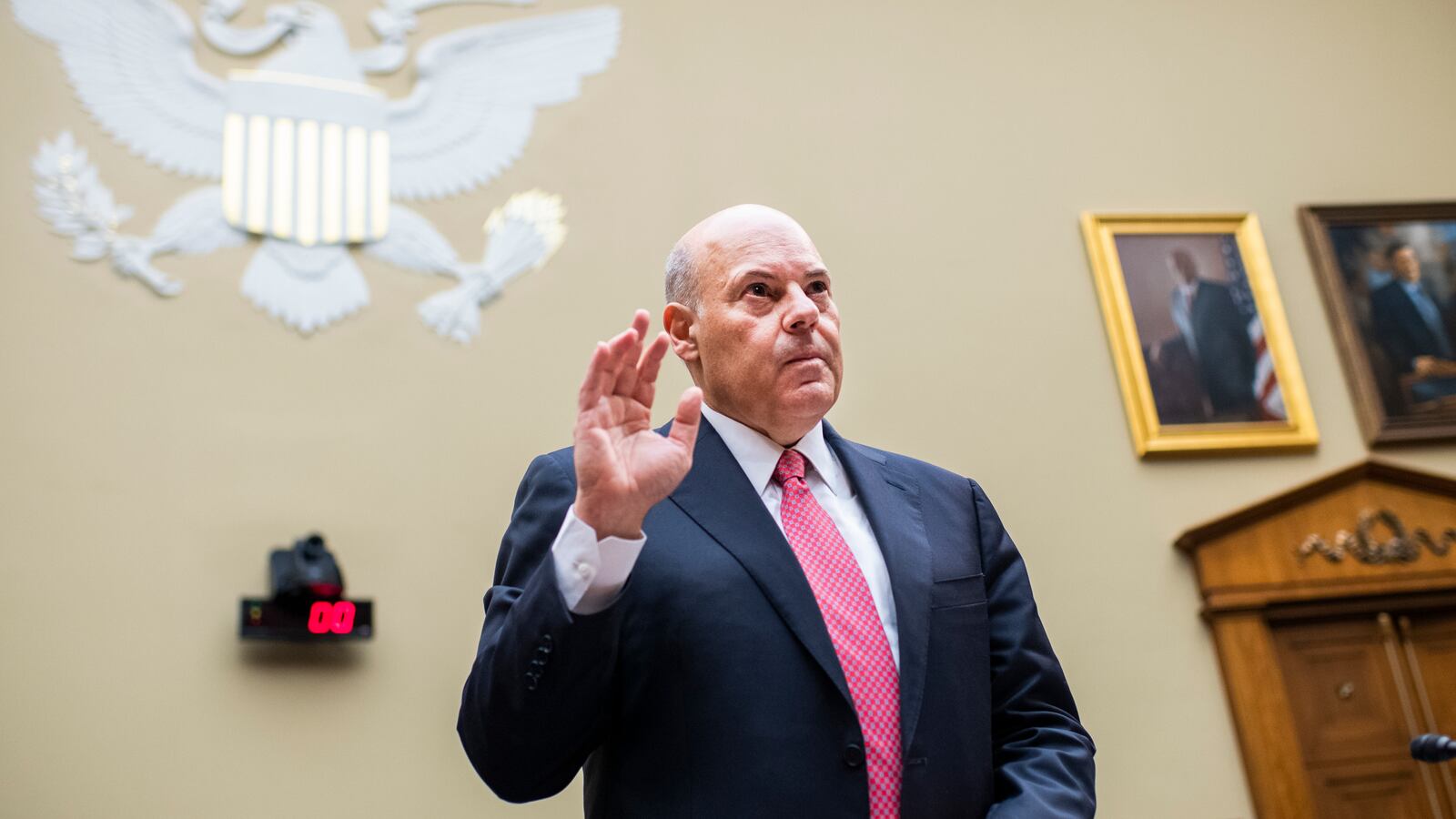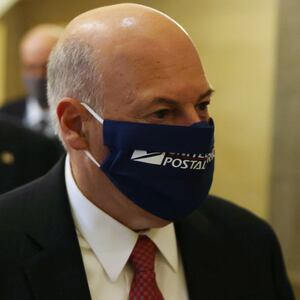Democrats have labored to make the case that Postmaster General Louis DeJoy knowingly acted as a henchman for President Donald Trump's designs on the U.S. Postal Service.
But during a high-profile congressional hearing on Monday, they might have made a different point more successfully: that he doesn’t know what he’s doing.
When he took over the Postal Service’s top job in June, DeJoy, a former logistics executive and Trump mega-donor, presided over an overhaul of mail delivery practices supposedly designed to make the agency more effective and efficient. Instead, they led to significant nationwide delays, sparking concerns over the Postal Service’s ability to carry out its essential duties during a pandemic and an election year—concerns that Trump’s own attacks on the agency have only fueled.
Over the course of a six-hour hearing in the House Oversight Committee on Monday, DeJoy acknowledged the seriousness of the delays while strenuously pushing back on any suggestion his plans were part of a politically motivated scheme to handicap the USPS.
If DeJoy was confident on that front, however, he was much shakier on other topics of Democrats’ interrogation, raising questions about his grip on the agency’s basic structure and responsibilities.
Repeatedly, for example, DeJoy insisted that he only made one operational change that led to delays, and unequivocally denied that he’d overseen any rollback of postal workers’ overtime hours, a measure that reportedly was implemented in post offices around the country and contributed to delays.
But late in the hearing, DeJoy struggled to answer basic questions from Rep. Mike Quigley (D-IL) about the practice. “Are you certain no one is cutting overtime?” asked Quigley. “No, I’m not certain,” replied DeJoy, who added that he hadn’t done an audit on the practice—and wasn’t aware who had ordered the changes in the first place.
At other points, DeJoy said that he hadn’t ordered any study or analysis of the operational changes he’d implemented. “You don’t need much analysis to order trucks to a schedule,” bristled DeJoy, even though the schedule change ended up causing delivery disruptions that delayed vital supplies like medication, left food rotting in warehouses, and left animals in transit to die there.
And DeJoy also couldn’t elaborate on a plan in place for the USPS to deliver ballots for November’s elections on time, which he committed to doing at a hearing before the GOP-controlled Senate oversight panel on Friday.
"Uh, I need to get back to you,” DeJoy told Rep. Ro Khanna (D-CA), who pressed him on it.
The new Postmaster’s ignorance of USPS operations seemed to extend far beyond the scope of what’s transpired in his own tenure. Rep. Katie Porter (D-CA), for example, asked DeJoy if he knew the cost of mailing a postcard. He did not, nor did he know the cost of mailing a square envelope.
“I will submit,” said the head of the U.S. Postal Service, “that I know very little about postage and stamps.”
And Rep. Brenda Lawrence (D-MI)—herself a 30-year career Postal employee—asked DeJoy if he was familiar with a specific U.S. legal code. He said he was not. The code in question, explained Lawrence, stipulated that the USPS is a “basic and fundamental service provided to the people by the government of the United States.”
At the end of the hearing on Monday, congressional Republicans—who largely cast DeJoy as a victim of another would-be Democratic conspiracy involving Trump—were proclaiming that Democrats had failed to prove any such conspiracy existed. “The Democrats are using this as a political ploy,” said Rep. James Comer (R-KY), ranking Republican on the Oversight panel, “spinning this to try and benefit politically.” To punctuate his point, he compared the USPS oversight efforts to Rep. Adam Schiff’s (D-CA) impeachment investigation—a name synonymous with malfeasance and witch hunts in Trumpworld.
Democrats had a harder time coaxing many admissions or revelations out of DeJoy about his association with Trump or his communication with the White House or his campaign. Such bombshells, however, may not have even been expected. As several lawmakers’ lines of questioning revealed, Democrats may have believed their most resonant point was that a steadfast Trump ally botched his handling of a key public service, whether he meant to or not, playing into the president’s longstanding animus toward the USPS.
“If you think you could implement the changes you did without the negative impact we’ve seen, then I worry about your judgment,” said Rep. John Sarbanes (D-MD), distilling the crux of Democrats’ general line of questioning that day. “And if you did understand what that impact would be, I’m concerned about your motives.”
Trump himself did not select DeJoy as Postmaster General; rather, he was picked by the agency’s bipartisan board of governors. However, recent reporting has revealed signs of an unusual selection process. Treasury Secretary Steven Mnuchin took an outsize role in the search for a new postmaster general this year, according to the New York Times, which also reported that a board member with deep ties to Trump and the GOP personally recommended DeJoy.
DeJoy, who hosted a fundraiser for Trump at his home in 2017, was not a traditional candidate for the job: he ran logistics companies that interacted with the USPS but had no direct experience with the agency. David C. Williams, a former USPS inspector general and board member, told House lawmakers on Friday that DeJoy was not seen as a “serious candidate” for the job, but got it anyway.
Democrats repeatedly raised these connections, which DeJoy bristled at, along with the prospect that Trump had paved the way for a strong supporter to take over an agency he’s derided as a “loser” or part of a “scam.”
Most aggressive among them was Rep. Jim Cooper (D-TN), who asked DeJoy whether he offered bonuses to employees at his past private-sector companies who contributed to the Trump campaign. “That’s an outrageous claim,” he said, “and I resent it.” Cooper then asked DeJoy if he planned to get pardoned by Trump like Roger Stone did, prompting steely anger from the witness and groans from the GOP side of the dais.
Lawmakers who didn’t pull out the rhetorical equivalent of a bazooka gun in their questioning got a bit further in pinning down DeJoy over the extent of his connections with Trumpworld. Rep. Gerry Connolly (D-VA), for example, went after that very subject, plainly asking DeJoy to elaborate on his concerns about Trump’s rhetoric about mail-in voting.
In doing so, the Postmaster General seemed to go back on his prior assertions he had no contact with the president’s campaign. “I have put around to different people that this is not helpful,” said DeJoy. “I have not spoken to the Trump campaign leadership in that regard. I’ve spoken to people that are friends of mine, who are associated with the campaign.”
At another point, DeJoy also seemed to go back on his prior assertions that he would not be willing or able to restore the 10 percent of USPS mail sorting machines that have gone offline during his tenure.
What’s the harm, asked Khanna, of putting those machines in before the election to improve public confidence in the outcome, even if it cost $1 billion? DeJoy responded that the USPS didn’t have the money. “Give me the billion,” he said, “and I’ll put the machines in.”






